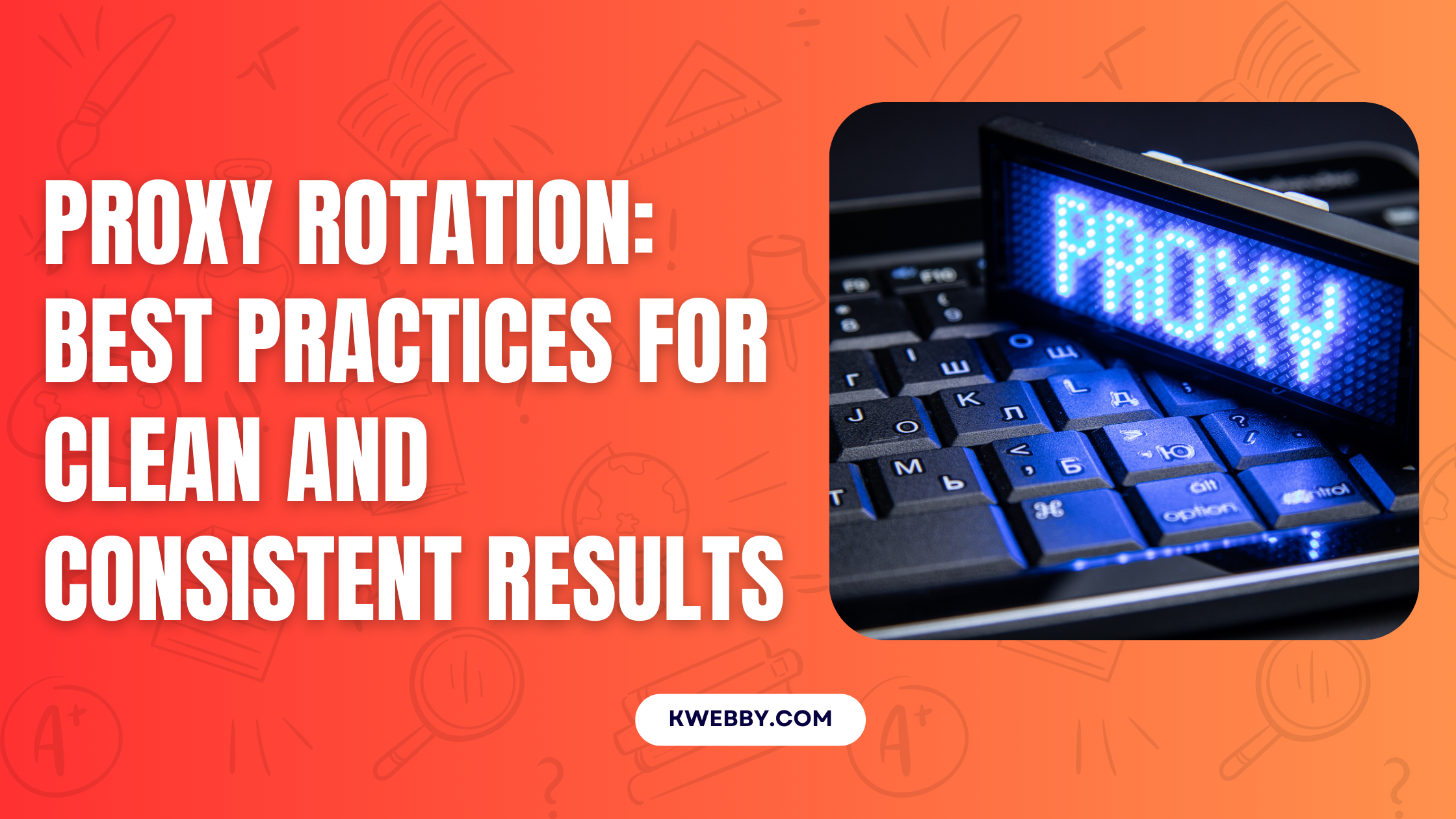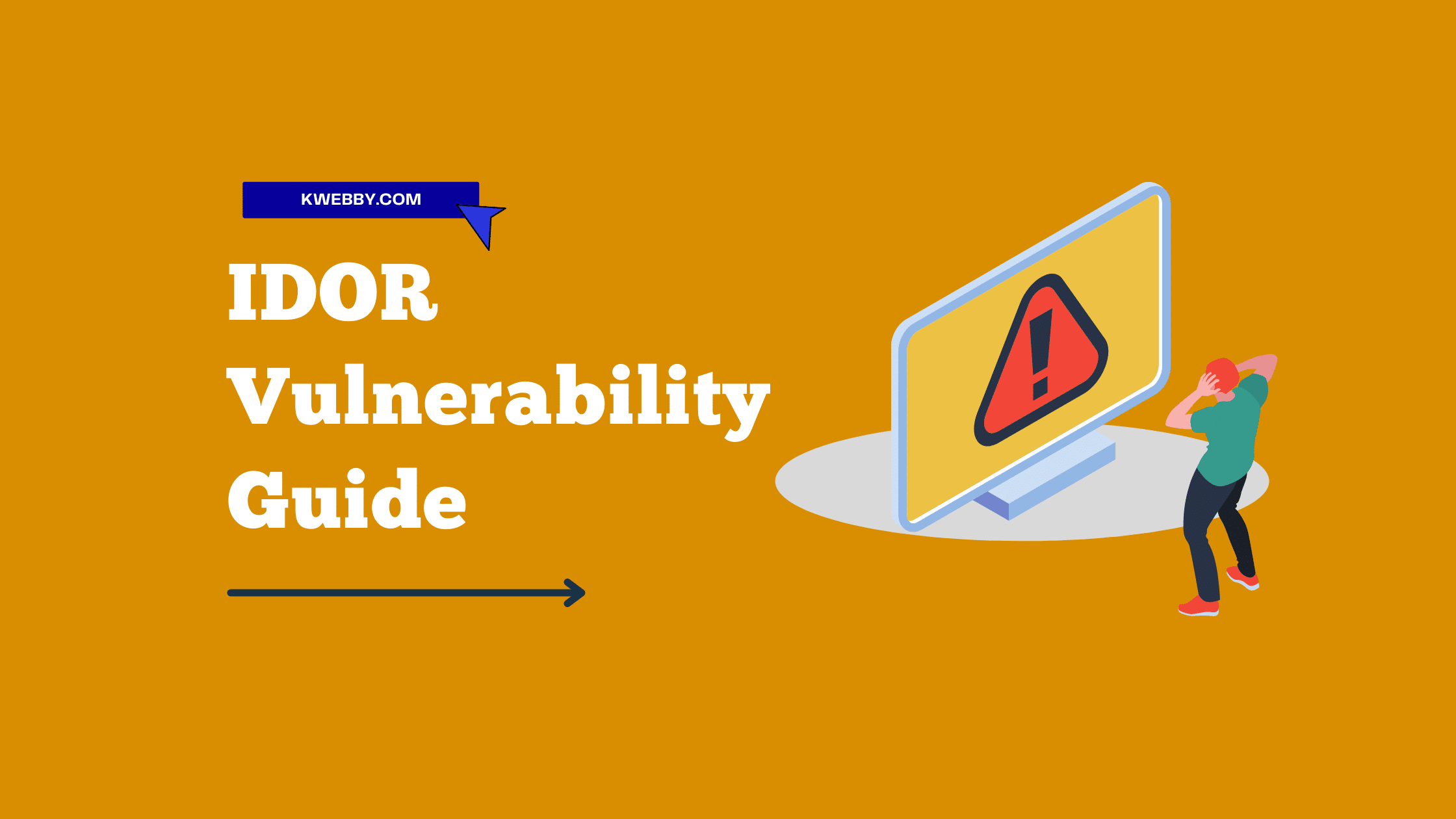When it comes to ensuring clean and consistent results in tasks like web scraping or managing multiple social media accounts, proxy rotation is a crucial practice. Rotating residential proxies and other proxy types, such as datacenter proxies or mobile proxies, help prevent issues like ip bans or ip blocks by automatically switching between new ip addresses within a proxy pool.
Using a rotating proxy service or employing a rotating proxy server ensures that the same ip address is not repeatedly used, offering a seamless and efficient solution for tasks requiring anonymity and scalability.
Whether through rotating datacenter proxies, residential ips, or isp proxies, automatic proxy rotation provides the flexibility and security needed for activities across different proxy networks.
Reliable rotating proxies are essential for bypassing restrictions and maintaining smooth operation, making them a valuable tool for web scrapers, proxy service providers, and anyone needing robust proxy solutions.
What is Proxy Rotation and Why Does it Matter?
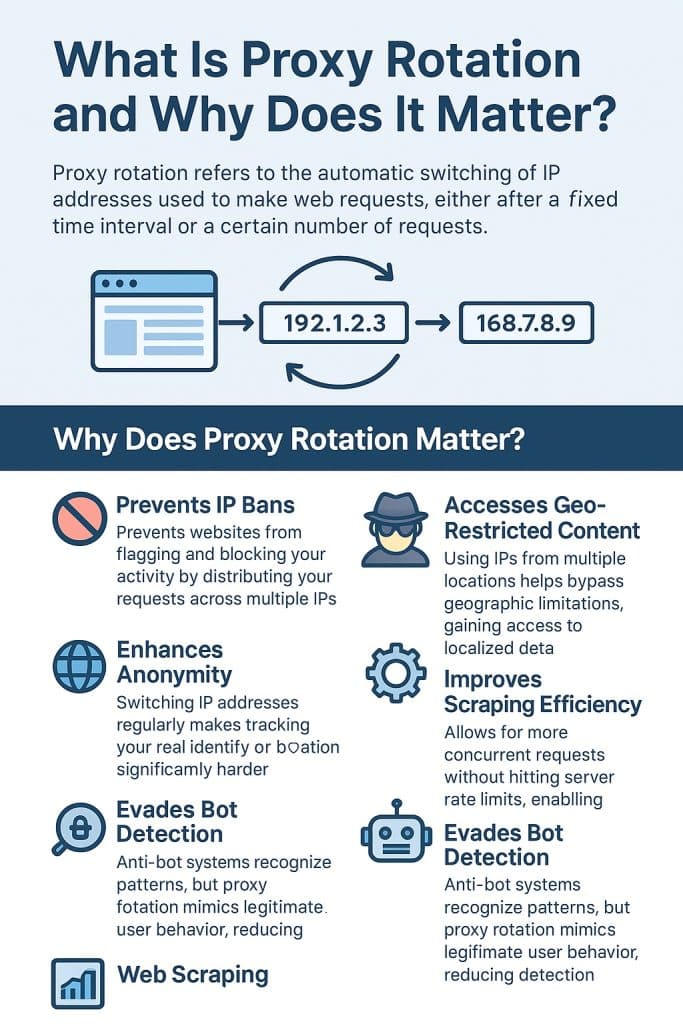
Proxy rotation refers to the automatic switching of IP addresses used to make web requests, either after a fixed time interval or a certain number of requests. This technique helps distribute traffic across multiple IPs, minimizing detection and avoiding blocks. Imagine browsing a website with an IP address that changes every few seconds or after each page load — that’s proxy rotation in action.
This process is typically implemented through:
- Rotating Proxy Providers such as residential, mobile, or datacenter proxies.
- Proxy Management Tools or Scripts that automate IP switching based on conditions like time, request volume, or errors.
By dynamically changing IPs, proxy rotation emulates organic browsing or user behavior, making it incredibly effective for large-scale online activities like web scraping or data collection.
Why Does Proxy Rotation Matter?
- 🚫 Prevents IP Bans: Prevents websites from flagging and blocking your activity by distributing your requests across multiple IPs.
- 🕵️ Enhances Anonymity: Switching IP addresses regularly makes tracking your real identity or location significantly harder.
- 🌍 Accesses Geo-Restricted Content: Using IPs from multiple locations helps bypass geographic limitations, gaining access to localized data.
- ⚙️ Improves Scraping Efficiency: Allows for more concurrent requests without hitting server rate limits, enabling faster data retrieval.
- 🤖 Evades Bot Detection: Anti-bot systems recognize patterns, but proxy rotation, coupled with user-agent and header rotation, mimics legitimate user behavior, reducing detection.
Use Cases
- Web Scraping: Essential for gathering extensive data from search engines, online marketplaces, or public databases without restrictions.
- Price Monitoring and Aggregation: Ideal for tracking prices internationally or across competitors while avoiding bans.
- SEO Monitoring: Automating search engine position checks safely and efficiently.
- Ad Verification: Ensures that ads are displayed correctly in different regions and not misrepresented.
- Social Media Management: Facilitates managing multiple accounts and automating activities without risking penalties.
Proxy rotation is an indispensable tool for anyone looking to operate securely, avoid bans, and access the internet efficiently for data-driven activities. Whether you’re managing automation scripts or performing large-scale data collection, it provides a robust solution to overcome challenges posed by modern online systems.
Best Practices For Clean and Consistent Results
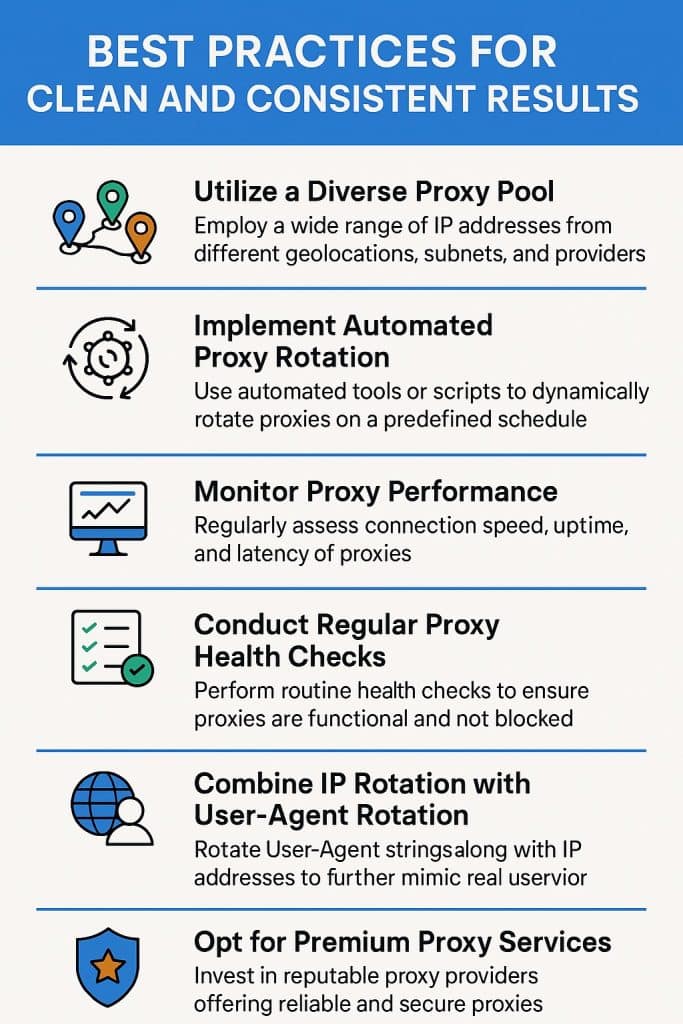
Mastering proxy rotation is essential for maintaining anonymity, preventing IP bans, and ensuring efficient data collection during web scraping activities. Implementing best practices can greatly enhance the success rate and reliability of your scraping efforts.
Utilize a Diverse Proxy Pool
Employing a wide range of IP addresses sourced from different geolocations, subnets, and providers is crucial. This diversity helps bypass anti-scraping measures effectively and minimizes the risk of detection. For instance, mixing residential proxies and datacenter proxies can help ensure that you are not relying on the same IP address repeatedly. A rotating residential proxy pool can significantly improve your scraping results by providing access to a vast proxy network.
Implement Automated Proxy Rotation
Using automated tools or scripts simplifies the process of dynamically rotating proxies. Automatic proxy rotation ensures new IP addresses are used on a predefined schedule or based on specific triggers. For example, tools like Zyte or ScraperAPI can switch between rotating IP addresses seamlessly, reducing manual effort and ensuring that proxies are always fresh and functional.
Monitor Proxy Performance
Regularly assessing proxy performance is vital for smooth operations. Key metrics such as connection speed, uptime, and latency should be carefully monitored. For example, rotating datacenter proxies that exhibit slow speeds or high latency can obstruct operations, making it critical to replace underperforming IPs with more reliable proxies.
Conduct Regular Proxy Health Checks
Routine proxy health checks ensure that proxies are functional, available, and not flagged by target servers. For example, if certain proxies in your rotating proxy network are blocked, performing health validations allows you to quickly identify and replace them. Consider using automated scripts to check proxy lists for better efficiency.
Combine IP Rotation with User-Agent Rotation
Rotating IP addresses is effective, but combining this with User-Agent rotation adds an extra layer of protection. Sending HTTP requests with varied User-Agent strings mimics real user behavior, making it more difficult for websites to detect scrapers. For example, while using proxies for web scraping, you can alternate between User-Agents such as Chrome and Firefox to simulate browsing activities.
Opt for Premium Proxy Services
Investing in high-quality proxy providers ensures access to reliable and secure proxies. Reputable proxy service providers often offer residential IPs and mobile proxies that are less likely to be flagged compared to free proxies. For instance, using a service offering rotating residential proxies or static residential proxies can dramatically improve your scraping success rate.
Respect Target Website’s Terms of Service
It is important to scrape websites responsibly by adhering to their terms of service. Ethical scraping practices not only ensure compliance but also reduce the likelihood of being detected or facing IP blocks. For instance, scraping slowly and respecting request limits can help you avoid common issues with proxy server usage.
By applying these best practices, you can maximize the effectiveness of your rotating proxy service, avoid IP bans, and collect data efficiently. Incorporating techniques like automatic IP rotation, maintaining a reliable proxy pool, and using rotating mobile proxies ensures smooth and consistent results across your web scraping projects.
Avoiding Detection: The Role of Smart Rotation
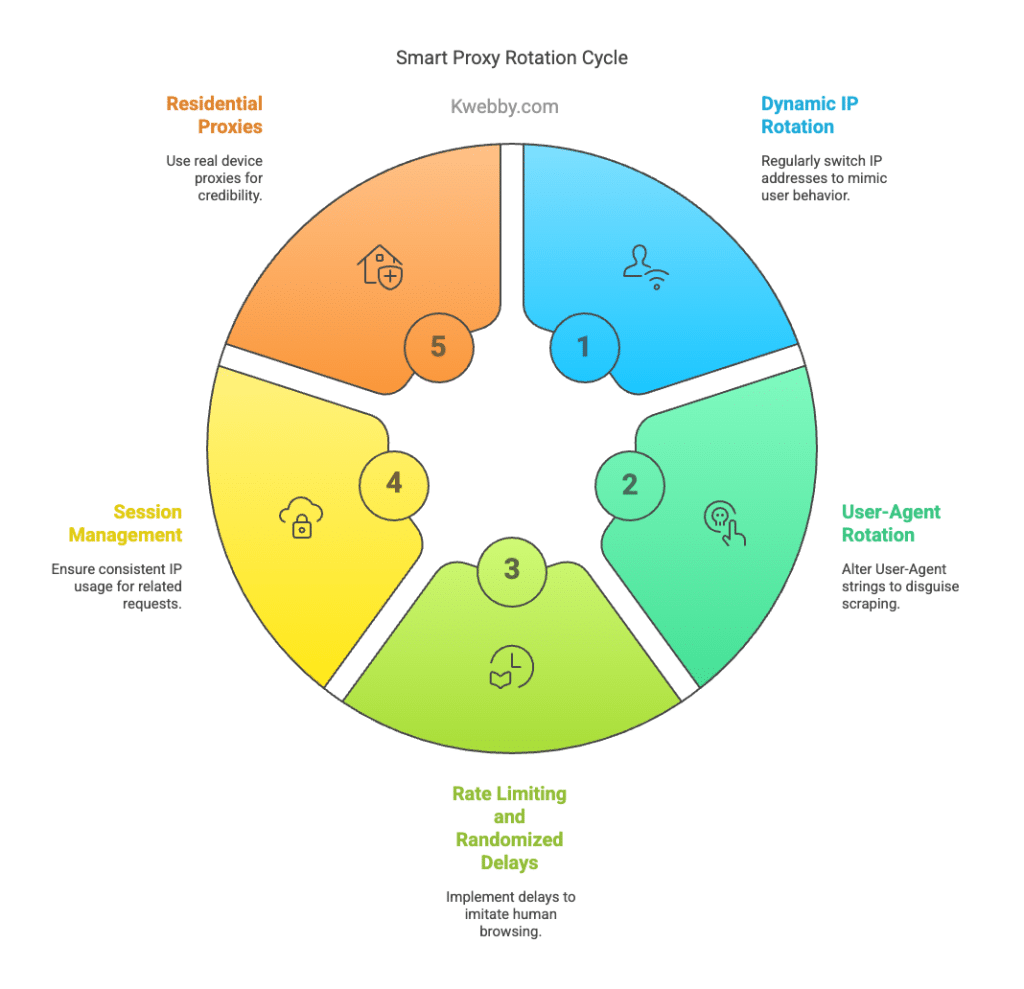
Implementing smart proxy rotation is essential to avoid detection while web scraping and maintaining consistent access to websites. This approach relies on systematic changes to IP addresses and other configurations to replicate natural user behavior. Key practices include:
- Dynamic IP Rotation: Regularly switching IP addresses during scraping helps distribute requests across multiple origins. This reduces the possibility of detection and prevents IP bans while mimicking genuine user activity.
- User-Agent Rotation: Altering User-Agent strings in HTTP headers can simulate various browsers and devices, further disguising automated scraping efforts and avoiding anti-bot mechanisms.
- Rate Limiting and Randomized Delays: Adding random delays between requests and adhering to website rate limits imitates human browsing habits, lowering the risk of being flagged for suspicious activity.
- Session Management: Using the same IP address for a series of related requests ensures session consistency. This approach helps avoid detection systems that monitor sudden changes in session data.
- Residential Proxies for Credibility: Routing traffic through real devices with residential proxies enhances legitimacy and reduces the likelihood of detection compared to more easily identified datacenter proxies.
By combining methods like dynamic IP rotation, user-agent updates, and residential proxies, smart proxy rotation enables web scrapers to efficiently collect data while minimizing disruptions. Utilizing reliable proxy services and maintaining a robust proxy pool are crucial steps to ensure the best results.
Frequency Matters: How Often Should You Rotate Proxies?
Determining the optimal frequency for rotating proxies is vital to maintain anonymity and avoid detection while engaged in web scraping activities. The right rotation interval can vary based on the nature of the task, the type of proxies used, and the security measures of the target website. Below are key factors to consider for effective proxy rotation:
1. Nature of the Task
- High-Volume Scraping: When collecting large amounts of data, it’s essential to rotate the proxy IP after every 2-5 requests to prevent detection and reduce the risk of IP bans.
- Low-Volume Scraping: For minimal scraping activities, switching the proxy IP every 10-20 requests can be sufficient for maintaining stealth.
2. Target Website’s Security Measures
Websites with advanced anti-scraping mechanisms may demand more frequent IP rotations. Regularly monitor the website’s response patterns and adjust rotation intervals accordingly to avoid being flagged.
3. Type of Proxies Used
- Datacenter Proxies: Often more prone to detection, requiring rotation intervals of 10-30 minutes to minimize the risk of blocks.
- Residential Proxies: These are harder to detect and allow for longer intervals, typically 30-60 minutes, between rotations while being highly reliable for web scraping.
- Mobile Proxies: Known for their flexibility, mobile proxies can sustain sessions longer, allowing a rotation frequency of every 60-120 minutes.
4. Session Requirements
For tasks that involve persistent sessions, such as remaining logged into an account, it’s crucial to use longer rotation intervals. This prevents session interruptions that could disrupt workflows.
5. Proxy Pool Size
A larger proxy pool offers greater flexibility in rotation, reducing the chance of the same IP address being reused too often. This is particularly helpful when scraping websites with strict rate-limiting policies.
6. Understanding Rate Limiting Policies
Matching your rotation frequency to the rate limits imposed by the target website is essential. Doing so ensures that request patterns avoid triggering detection systems and keeps the scraping activity undetected.
Recommended Frequency Guidelines:
| Task | Rotation Frequency |
|---|---|
| Web Scraping (Aggressive) | Every 1-5 requests |
| Web Scraping (Light) | Every 10-20 requests |
| Session-Dependent Access | Every 30-60 minutes |
| SEO Monitoring | Every 3-5 keywords |
| Ad Verification | Every page/request |
Best Practices
- Monitor Performance: Continuously evaluate the efficiency of your proxy rotation strategy by analyzing website responses and adjusting as needed.
- Use Randomized Intervals: Randomizing the frequency of rotations prevents predictable patterns, making the approach more human-like.
- Combine with User-Agent Rotation: Altering User-Agent strings in tandem with rotating IP addresses improves disguise and reduces the chances of detection.
- Diversify Proxy Types: Using a mix of datacenter and residential proxies or even rotating mobile proxies can enhance the versatility and success of web scraping efforts.
- Leverage Reliable Proxy Providers: Working with trusted proxy service providers ensures access to high-quality rotating proxy networks and proxy servers.
Session Management: Sticky vs. Rotating IPs
Understanding the differences between sticky IPs and rotating IPs is key to optimizing session management strategies for online activities. Whether you’re managing social media accounts, performing web scraping, or accessing geo-restricted content, choosing the correct proxy type can tremendously impact your success and efficiency. Below is a comparative overview to guide your selection process:
| Aspect | Sticky (Static) IPs | Rotating IPs |
|---|---|---|
| Definition | Maintains the same IP address for a set duration or entire session. | Changes the IP address with each request or after a specified time interval. |
| Session Consistency | Provides a consistent IP, facilitating uninterrupted sessions. | Each request uses a different IP, which may disrupt session continuity. |
| Anonymity Level | Lower anonymity due to a persistent IP address. | Higher anonymity as IP addresses change frequently, making tracking difficult. |
| Risk of Detection | Higher risk if multiple requests are made from the same IP, potentially leading to blocks. | Lower risk since requests come from various IPs, reducing the chance of detection. |
| Ideal Use Cases | – Managing social media accounts – Online shopping with multi-step processes – Accessing services requiring login sessions – Tasks needing consistent identity | – Large-scale web scraping – SEO monitoring across regions – Accessing geo-restricted content – Avoiding IP bans and CAPTCHAs during data extraction tasks |
| Performance Stability | Generally more stable connections due to the consistent IP. | Performance may vary as different IPs may have different speeds and latencies. |
| Cost Implications | Often charged per IP address, which can be cost-effective for consistent usage patterns. | Typically charged based on bandwidth or number of IPs used, potentially increasing costs for high-volume activities. |
Choosing the right type of IP management depends on balancing session consistency with the level of anonymity and volume needed for your specific tasks.
For activities requiring persistence, such as managing accounts, sticky IPs or static proxies are the best fit. On the other hand, tasks demanding high anonymity and handling large volumes of requests—like data extraction or web scraping—are better suited to rotating proxies, such as rotating residential proxies or rotating datacenter proxies.
Choosing the Right Proxy Type for Smooth Rotation
Not all proxies are equal. Your use case will determine the best fit:
1. Residential Proxies
- Real IPs assigned by ISPs
- Harder to detect
- Ideal for scraping and ad verification
2. Datacenter Proxies
- Fast and cheap
- Easier to detect
- Useful for non-sensitive scraping
3. Mobile Proxies
- Assigned to mobile devices
- High trust level
- Best for sensitive account management
| Type | Speed | Anonymity | Cost | Detection Risk | Best Use Case |
| Residential | Medium | High | High | Low | Web scraping, verification |
| Datacenter | High | Medium | Low | High | SEO tracking, testing |
| Mobile | Low | Very High | Very High | Very Low | Social media automation |
The Tools That Make It All Easier
Manual rotation is like trying to cook a full meal with just one burner—it’s doable, but not exactly efficient. Thankfully, there are tools out there that simplify rotation by integrating with scripts, bots, or browser automation tools.
Here’s what to look for:
- Random IP assignment
- Sticky session control
- Geo-targeting options
- IP whitelisting
One great resource on the topic is the proxy rotation best practices guide by Proxys.io, which dives deeper into tactical implementation.
Whether you’re managing a small campaign or scaling a large operation, having tools that offer flexible, customizable rotation rules will save you time and keep things running smoothly.
Final Thoughts!
By using the right tools and strategies, such as a rotating proxy service or a proxy pool, you can effectively manage web scraping tasks, avoid ip blocks, and ensure smooth operations without interruptions. Rotating residential proxies and datacenter proxies offer reliable solutions for tasks requiring frequent ip rotation, whether for managing multiple social media accounts or gathering data from challenging sources. Opting for premium proxies or a rotating proxy network can prevent issues like repeated ip bans and provide access to new ip addresses seamlessly. With proper rotation settings and a reliable proxy provider, you can harness the power of rotating proxies, sticky sessions, and other advanced features to optimize your campaigns efficiently.

